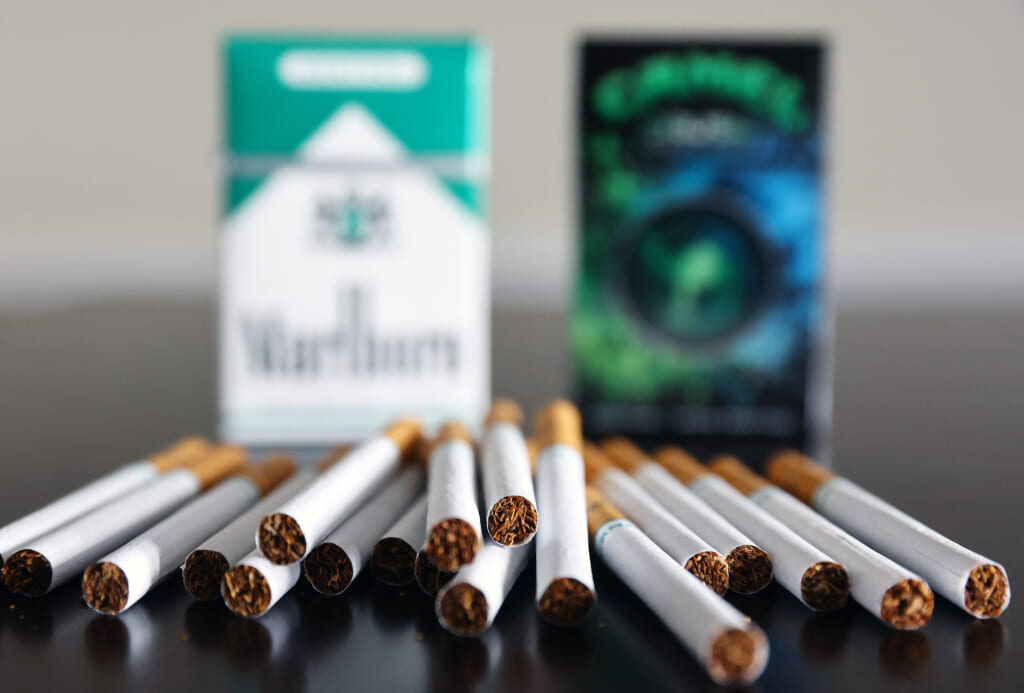Menthol cigarette companies historically targeted Black communities, researchers say
Magazine and billboard advertisements are among the strategic marketing methods practiced by tobacco industry leaders to increase Black consumership.
As national discussions about racial discrepancies in menthol cigarette use have been reignited by the Federal Drug Administration’s recently proposed ban on the highly addictive products, researchers are calling attention to the long history of menthol cigarette advertising which directly targeted Black communities.
Keith Wailoo, Princeton University professor, historian and author of the 2021 book Pushing Cool: Big Tobacco, Racial Marketing, and the Untold Story of the Menthol Cigarette, said that the latest effort to ban menthol cigarettes has been “a long time coming,” according to NPR.

Per The University of Chicago Press, Wailoo’s book contains an in-depth analysis of tobacco industry documents which exposes the creation of “buying habits and racial markets” for menthol cigarettes which have endured for decades. 85% of Black smokers preferred menthol cigarettes, according to a 2018 national survey published in the Oxford Journals of Nicotine & Tobacco Research.
Menthol, according to the FDA proposal, enhances the addictiveness of nicotine and the flavor makes cigarettes “easier” to use, as reported by NPR. Because of this, Wailoo told the outlet, they are regarded by the industry as ideal “starter products.”
Tobacco companies in 1964 were federally prohibited from marketing to buyers under the age of 21, after which “the industry began to pivot aggressively towards targeted marketing in Black communities,” Wailoo said.
A wave of imagery promoting menthol cigarettes was then seen on billboards in Black communities and in magazines with Black audiences, generating revenue that some publications began to rely on, Wailoo said.
“A lot of Black periodicals, like Ebony, became so dependent on tobacco advertising, that they were silent of the devastating impact of smoking in the Black community,” he told NPR, adding that marketing tactics also included strategically giving free samples to influential community figures.
Wailoo explained to the outlet that menthol cigarettes were given to Black barbers and bellhops as a market-building tactic, and tobacco companies also sought to increase Black consumership by sponsoring events including the Kool Jazz Festival with a promotional ad featuring Dizzy Gillespie.
According to NPR, racially targeted advertisements continued for decades. The outlet reported that a 2011 ad for Newport cigarettes featured a young, happy Black couple, enjoying a burger and fries with the word “pleasure!” tagged below.
The NAACP is among the groups of advocates nationwide voicing support for the FDA’s proposal to ban menthol and flavored cigarettes, a ban which comes after decades of attempts by the federal government to address the public health issues caused by tobacco smoking.
“Egregious marketing practices” throughout the tobacco industry’s history were referenced by the association in a statement addressed to Biden administration officials Secretary Xavier Becerra of the health and human services department and Ambassador Susan Rice, who directs the domestic policy council and advises the president on matters of racial inequity.
Rice, who is helping to lead the latest effort to ban menthol cigarettes, told theGrio’s April Ryan: “It is estimated that by banning menthol cigarettes, we will save up to 650,000 American lives. Of those, 240,000 people are Black lives.”
theGrio’s April Ryan contributed to this report.
TheGrio is FREE on your TV via Apple TV, Amazon Fire, Roku, and Android TV. Please download theGrio mobile apps today!


